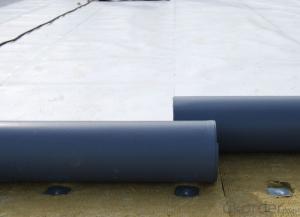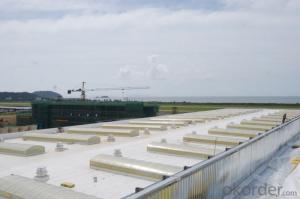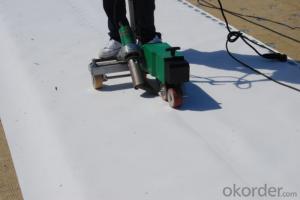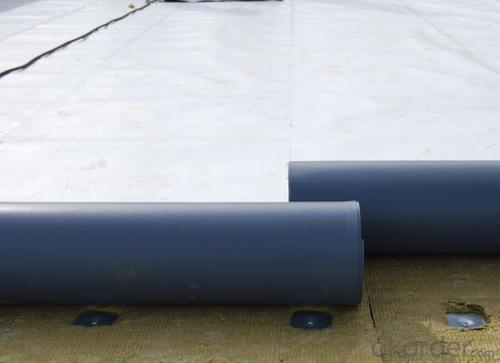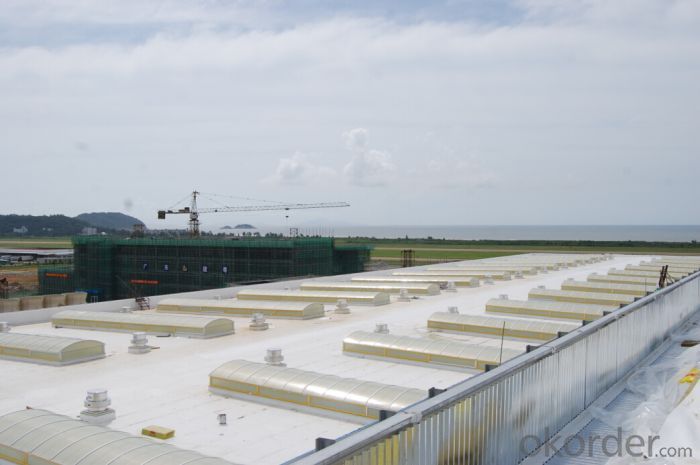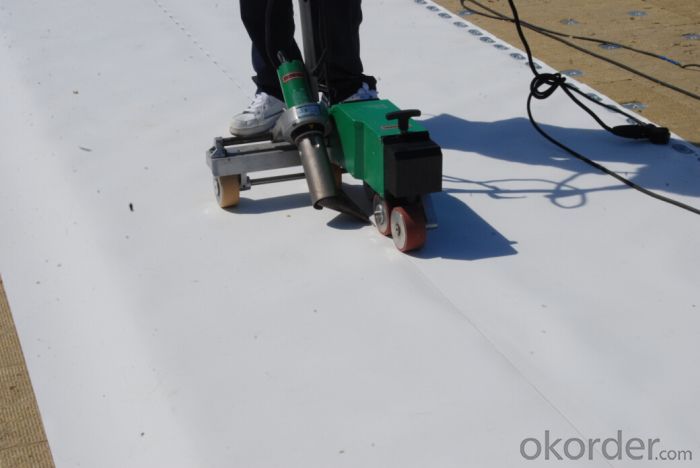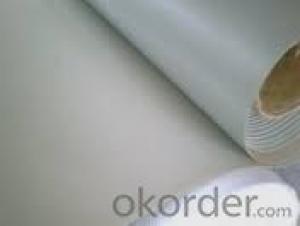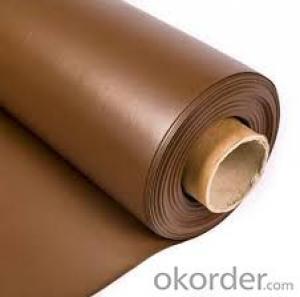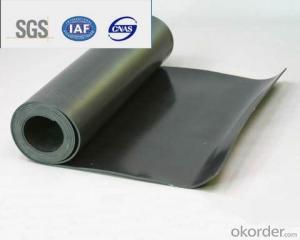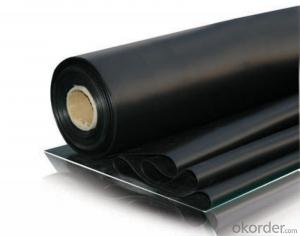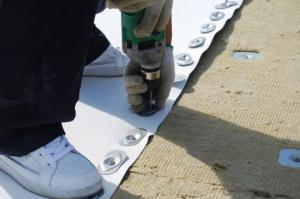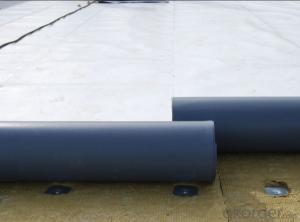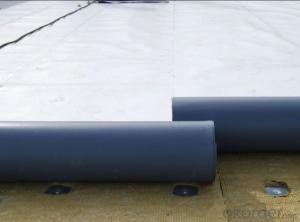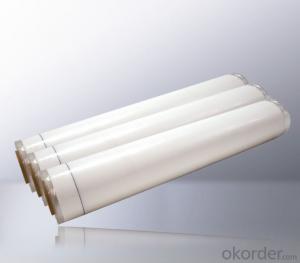TPO Waterproof Roofing Membrane Thickness with 1.2 mm
- Loading Port:
- Qingdao
- Payment Terms:
- TT OR LC
- Min Order Qty:
- 5000 m²
- Supply Capability:
- 10000 m²/month
OKorder Service Pledge
OKorder Financial Service
You Might Also Like
Product Description:
Description Of TPO membrane:
Tpo waterproof roofing membrane for sale
1.high breathable membrane
2.market:all over the world
3.resonable price
Main Features of TPO membrane:
- Easy installation with good system integrity, need few accessories
- High tensile and tear strength, puncture resistance
- No plasticizer, heat aging and UV resistance, durable
- Hot-air welding, rapid welding speed, high peel strength (two times of PVC)
-No chlorine, 100% recyclable, environment friendly
- Durable hot-air welding performance and convenient maintainance
- Smooth surface, unfading and stain resistance
Product Advantages:
1. Weather resistance and durability; Excellent weld ability;
2. No any crisp agents to prevent materials brittleness;
3. Intermediate enhanced polyester mesh fabric to have high tensile strength, fatigue resistance and penetrating resistance suitable for mechanically attached roofing systems;
4. Excellent the same high and low temperature resistance as rubber materials which can keep flexible at -50° C and keep mechanical strength in high temperature;
FAQ:
1. What are we supplying?
We are specialized in producing Colorful Asphalt Roof Shingle, SBS/APP modified bitumen waterproof membrane, Self adhesive bitumen waterproof membrane, PVC waterproofing membrane, EPDM rubber roofing membrane, Single Component Polyurethane Waterproof Coating, and Spray Polyurea Waterproof Coating.
2. How Many years experience do we have?
We have been exported to more than 20 countries in the past 15 years.
3. How long do we usually reply your request?
We always reply our customer within 24 hours.
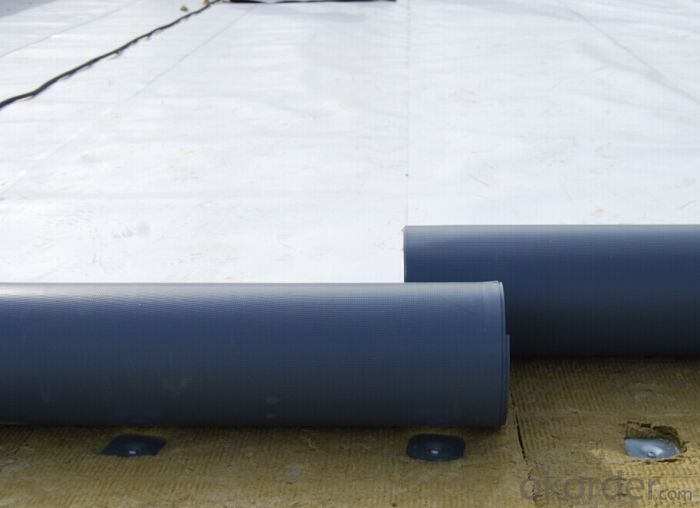
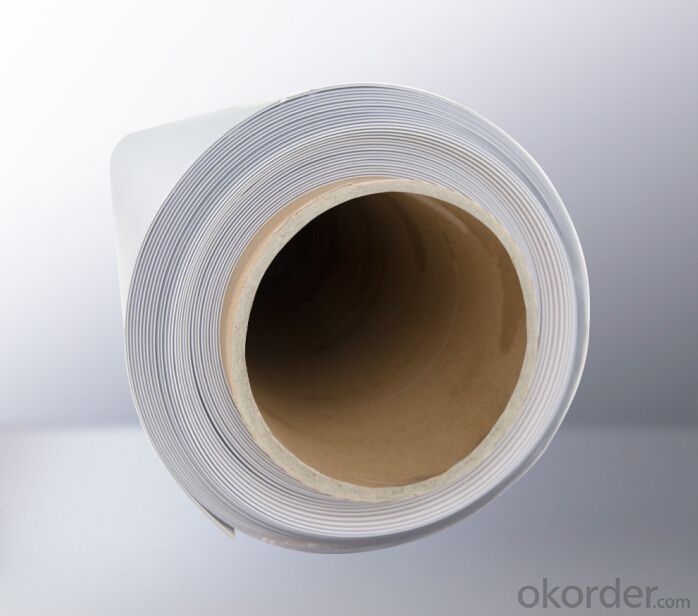
- Q: Can a waterproofing membrane be used in areas with high levels of salt or saltwater exposure?
- Yes, a waterproofing membrane can be used in areas with high levels of salt or saltwater exposure. Waterproofing membranes are designed to provide a protective barrier against moisture, including saltwater. They are often used in coastal regions, marine environments, or areas with high salt content in the soil to prevent water damage and corrosion.
- Q: What is the difference between a liquid and sheet-type waterproofing membrane?
- A liquid waterproofing membrane is a coating that is applied in liquid form and then dries to create a protective layer. It can be applied using a brush, roller, or spray. On the other hand, a sheet-type waterproofing membrane is a pre-manufactured material made of rubber, PVC, or bitumen. It comes in large rolls or sheets and is usually installed by overlapping the sheets and adhering them to the surface using adhesives or heat. When it comes to installation, liquid waterproofing membranes are generally easier to apply because they can be molded and shaped to fit different surfaces and contours. They can also be applied to both horizontal and vertical surfaces without the need for seams or joints. Sheet-type membranes, however, require precise measurements and cutting to properly fit the surface. They also require more labor and time to install due to the need for overlapping and sealing the joints. In terms of flexibility, liquid membranes have better flexibility as they can conform to irregular surfaces and movements without cracking or tearing. Sheet-type membranes, while somewhat flexible, may not be able to adapt as well to surface movements or changes in temperature. Another difference is durability and lifespan. Sheet-type membranes are typically thicker and more robust, offering a longer lifespan and better resistance to punctures and mechanical damage. Liquid membranes, although effective for waterproofing, may not be as durable or long-lasting, particularly in high-traffic areas or areas prone to damage. When it comes to cost, liquid waterproofing membranes are generally more cost-effective compared to sheet-type membranes. They require less labor and materials for installation, making them a more budget-friendly option. However, it's important to consider the specific requirements and conditions of the project to determine the most suitable type of waterproofing membrane. Overall, the choice between a liquid and sheet-type waterproofing membrane depends on various factors such as the nature of the project, surface conditions, required flexibility and durability, and budget constraints.
- Q: How does a waterproofing membrane handle exposure to UV radiation?
- Waterproofing membranes are specifically designed to withstand exposure to UV radiation, which is a common environmental factor that can cause deterioration and degradation of materials over time. In order to counteract the damaging effects of UV radiation, manufacturers typically incorporate UV stabilizers and additives into the production of waterproofing membranes. These substances serve as a barrier, either absorbing or reflecting the UV rays and preventing them from penetrating the membrane. Additionally, certain waterproofing membranes may include extra protective layers or coatings that further enhance their resistance to UV radiation. Ultimately, the inclusion of UV stabilizers and protective layers in waterproofing membranes guarantees their ability to endure prolonged exposure to UV radiation without compromising their performance or integrity.
- Q: Can a waterproofing membrane be used for seawalls or bulkheads?
- Yes, a waterproofing membrane can be used for seawalls or bulkheads. Waterproofing membranes are designed to provide a barrier against water penetration and can be applied to various structures, including seawalls and bulkheads. These membranes are typically made of materials such as bitumen, rubber, PVC, or polyurethane, which offer excellent resistance to water and ensure the structural integrity of the wall or bulkhead. The membrane is applied to the surface of the structure, forming a continuous and durable waterproof layer that prevents water from seeping through. This helps protect the seawall or bulkhead from erosion, corrosion, and other forms of damage caused by exposure to seawater. Additionally, waterproofing membranes can also provide additional benefits such as increased durability, improved aesthetics, and enhanced resistance to UV rays and chemicals. Overall, the use of a waterproofing membrane is an effective solution for ensuring the long-term performance and durability of seawalls and bulkheads in marine environments.
- Q: Is the waterproofing membrane an insulating material?
- Insulation board: plastic plate is made of plastic sheet, plastic for the synthesis of polymer compounds, can be free to change the body style. Plastic is the use of monomer raw materials to synthesis or condensation reaction polymerization of materials, synthetic resin and filler, plasticizers, stabilizers, lubricants, colorants and other additives, and its main component is synthetic resin.
- Q: Can a waterproofing membrane be used for railways or train stations?
- Railways and train stations can certainly benefit from the use of waterproofing membranes. These membranes are widely employed in construction projects to safeguard structures from water damage and promote their longevity. In the case of railways and train stations, where they are constantly exposed to weather conditions and the possibility of water infiltration, waterproofing membranes play a vital role in preventing water from seeping into the infrastructure. Waterproofing membranes are typically applied to different areas of railways and train stations, including underground tunnels, platforms, parking areas, and even roofs. These membranes create a barrier that prevents water and moisture from penetrating the structure and causing harm. By averting water infiltration, waterproofing membranes help maintain the structural integrity of railways and train stations, ultimately prolonging their lifespan. In addition to water protection, these membranes offer other benefits such as inhibiting the growth of mold and mildew, enhancing energy efficiency by reducing heat loss, and improving overall durability. They come in various types, such as liquid-applied membranes, sheet membranes, and cementitious coatings, providing flexibility in application based on the specific requirements of the railway or train station project. All in all, it is highly recommended to utilize waterproofing membranes in railways and train stations to ensure their long-term performance and maintenance.
- Q: Is a waterproofing membrane compatible with different types of flooring materials?
- Different types of flooring materials can be used with a waterproofing membrane. The purpose of a waterproofing membrane is to create a barrier between the subfloor and the flooring material, preventing moisture from causing any damage. This means that it can be used with laminate, vinyl, tile, and even hardwood flooring. By using a waterproofing membrane, the flooring material will remain protected from water damage, allowing it to last longer and maintain its appearance. However, it is important to keep in mind that specific compatibility requirements may exist for different types of waterproofing membranes. Therefore, it is advisable to consult the manufacturer's guidelines to ensure the proper installation of the chosen flooring material.
- Q: Can a waterproofing membrane withstand heavy rain or water pressure?
- Yes, a waterproofing membrane is designed to withstand heavy rain and high water pressure. It is specifically engineered to create a barrier that prevents water from penetrating through, ensuring the protection and integrity of the underlying structure.
- Q: Can a waterproofing membrane be used for roof gardens?
- Indeed, the utilization of a waterproofing membrane is applicable for roof gardens. In truth, it is strongly advised to implement a waterproofing membrane on the roof prior to establishing a garden in order to avert water leakage and harm to the underlying structure. Acting as a shield between the garden and the roof, the waterproofing membrane guarantees that water does not permeate through, thus preventing issues like leaks, mold, or structural destruction. It aids in safeguarding the roof against moisture, root intrusion, and other elements of the environment. Consequently, the inclusion of a waterproofing membrane is imperative for the prosperous and enduring installation of a roof garden.
- Q: Does a waterproofing membrane require any specific curing time before it can be exposed to water?
- Yes, a waterproofing membrane typically requires a specific curing time before it can be exposed to water. The curing time allows the membrane to fully bond and form a protective barrier against water penetration. This time frame can vary depending on the type of membrane and manufacturer's instructions. It is crucial to adhere to the recommended curing time to ensure the membrane's effectiveness and durability. Premature exposure to water before the curing process is complete could compromise the membrane's performance and lead to water leakage or damage. Therefore, it is essential to follow the manufacturer's guidelines and allow the necessary curing time before subjecting the waterproofing membrane to water.
Send your message to us
TPO Waterproof Roofing Membrane Thickness with 1.2 mm
- Loading Port:
- Qingdao
- Payment Terms:
- TT OR LC
- Min Order Qty:
- 5000 m²
- Supply Capability:
- 10000 m²/month
OKorder Service Pledge
OKorder Financial Service
Similar products
Hot products
Hot Searches
Related keywords
